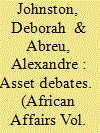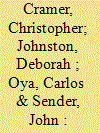| Srl | Item |
| 1 |
ID:
147228


|
|
|
|
|
| Summary/Abstract |
Asset indices are ubiquitous in the debate about well-being in African countries, not least because of the paucity of traditional household income and expenditure data. Indeed, asset data have fuelled the creation of a new, more optimistic picture of well-being in Africa, where both income and the middle class are growing fast. This is the first review of the use of asset indices for African countries. Readers are guided through key debates over the use of asset data, including the use of assets to measure trends over time as well as socio-economic status and class. We argue that the theoretical and empirical advantages of the asset index over traditional welfare measures are clear, but that caution is needed. Most asset indices show significant improvements in private wealth and social welfare in African countries due to increases in the number of household assets and improvements in health and education. However, we argue that simplistic conclusions in the economics literature about the growth of income or of a ‘middle class’ using asset indices are poorly founded.
|
|
|
|
|
|
|
|
|
|
|
|
|
|
|
|
| 2 |
ID:
145188


|
|
|
|
|
| Summary/Abstract |
Drawing on examples from rural Ethiopia and Uganda, this research note highlights some of the difficulties experienced in fieldwork. These difficulties do not justify the reluctance of increasingly risk-averse universities and funders to support independent fieldwork in Africa, but they do show that the rationale for research and the features of its design can provoke animosity and tensions. They also show that our own failure on occasion to appreciate local political dynamics made the situation more difficult. Challenges and threats came not only from local political forces but also from multinational companies and Fairtrade organizations uncomfortable with our findings and with fully independent research. The research note argues that the details of our experience have a practical value for other researchers, and that at least some of them should be treated as substantive forms of evidence and insight, rather than simply as threats or failures. We conclude that some crude best-practice norms and pressures on academics to form partnerships to conduct policy-relevant work may undermine the potential for truly independent and intensive field research. However, crises should not necessarily be seen as an unwelcome interruption to smooth processes of research; they can illuminate the context and power relations that the research is trying to understand.
|
|
|
|
|
|
|
|
|
|
|
|
|
|
|
|
| 3 |
ID:
058868


|
|
|
|
|
| Publication |
London, Pluto Press, 2005.
|
| Description |
xi, 268p.
|
| Standard Number |
0743522980
|
|
|
|
|
|
|
|
|
|
|
|
Copies: C:1/I:0,R:0,Q:0
Circulation
| Accession# | Call# | Current Location | Status | Policy | Location |
| 049139 | 320.513/SAA 049139 | Main | On Shelf | General | |
|
|
|
|